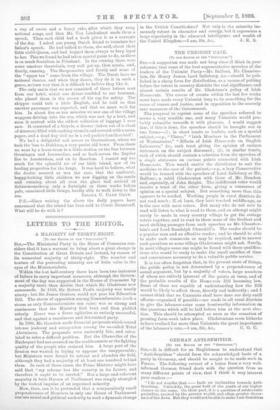LETTERS TO THE EDITOR.
A MAJORITY OF THIRTY-EIGHT.
[To THE EDITOR OF THE " FIPECTATOR.1 SIR,—The Ministerial Party in the House of Commons con- siders that it has a warrant to bring about a great change in the Constitution of Great Britain and Ireland, by reason of its numerical majority of thirty-eight. The number and texture of the protesting minority are of little value in the eyes of the Ministerialists.
Within the lost half-century there have been two instances of failure to carry important measures, although the Govern- ment of the day was supported in the House of Commons by a majority more than double that which Mr. Gladstone now commands. In 1843, Sir Robert Peel's majority was nearly ninety; but Sir James Graham could not pass his Education Bill. The storm of opposition among Nonconformists (such a storm as only Nonconformists can raise) was so strong and continuous that the Ministry first bent and then yielded utterly. Never was a fierce agitation so entirely successful, and that against a unanimous and determined party. In 1890, Mr. Goschen made financial proposals which roused intense jealousy and antagonism among the so.called Total Abstainers. The proposals were eminently fair, and calcu- lated to solve a difficult problem. But the Chancellor of the Exchequer had not counted on the stubbornness or the fighting quality of the people who resisted him. A large part of the Session was wasted in trying to appease the unappeasable; but Ministers were forced to retreat and abandon the field, although they had a majority of at least one hundred behind them. In each of these cases, the Prime Minister might have said that "my scheme has the country in its favour, and therefore it ought to be carried." But a large and coherent majority in both Houses of Parliament was simply strangled by the violent impulse of an organised minority.
How, then, can it be pretended that a comparatively small preponderance of Members in only one House of Parliament will ere moral and political authority to work a dynamic change in the British Constitution ? Not only is the minority im- mensely robust in character and energy, but it represents a. large superiority in the educated intelligenes and wealth of the United Kingdom.—I am, Sir, &c., J. K. S.


































 Previous page
Previous page